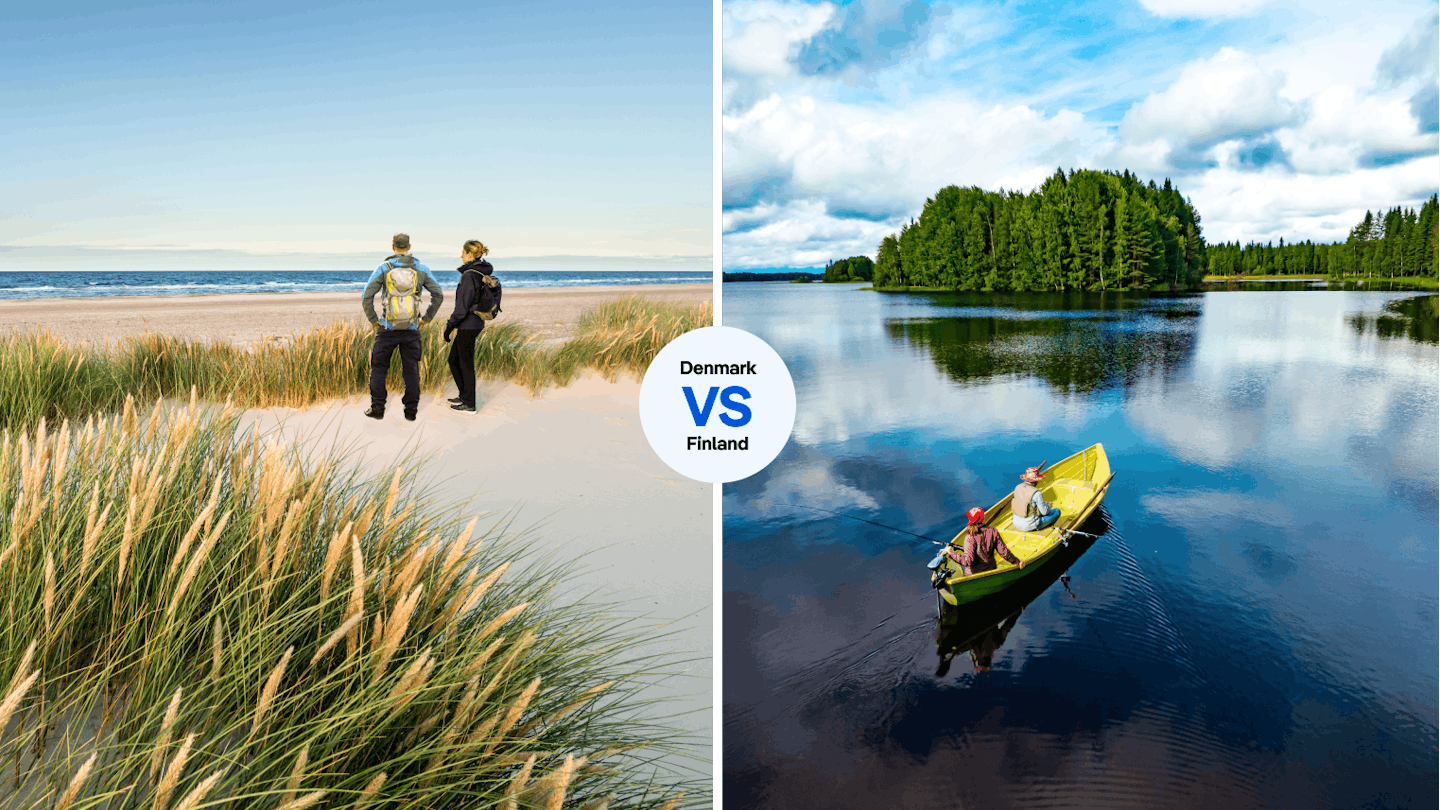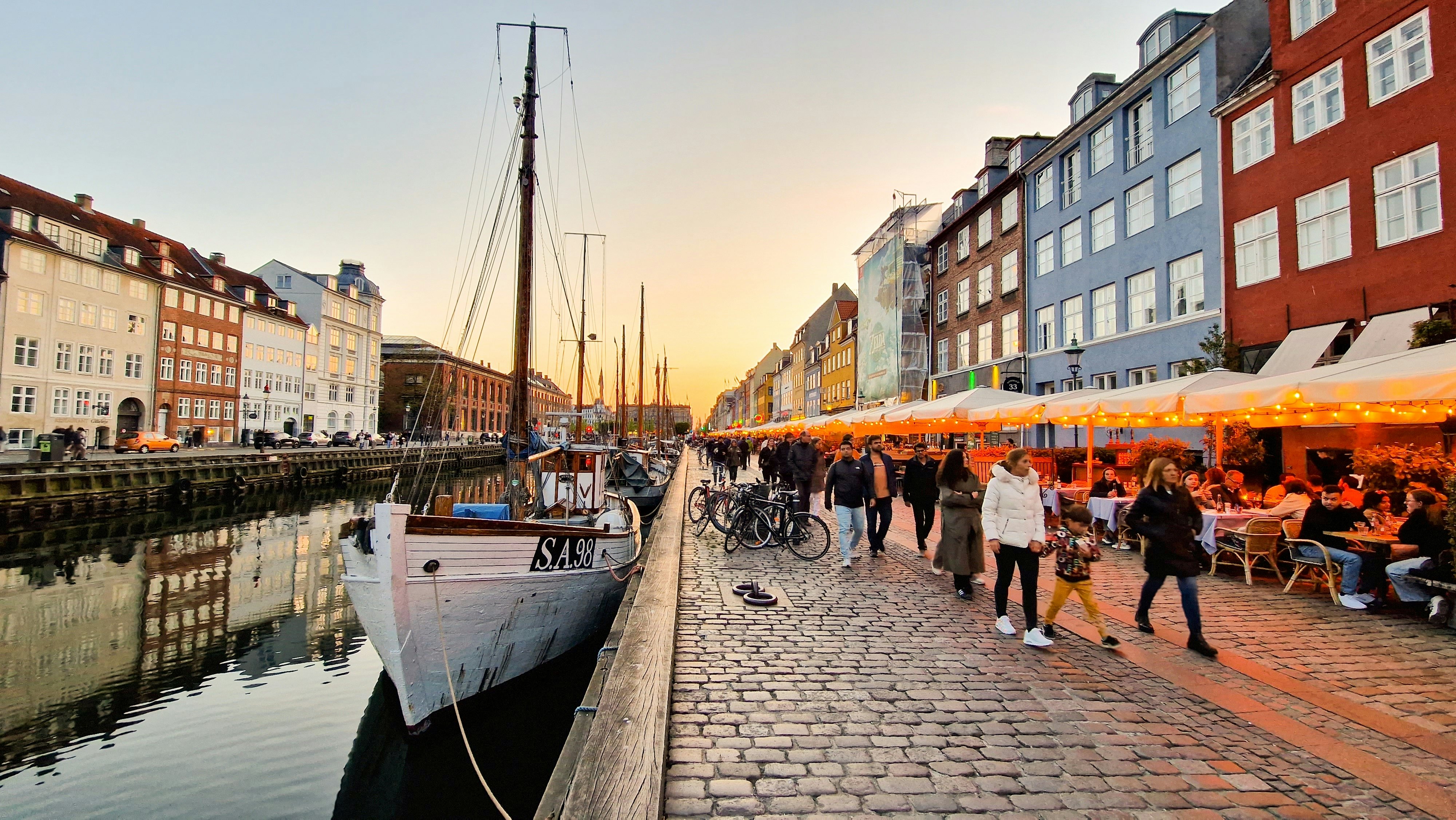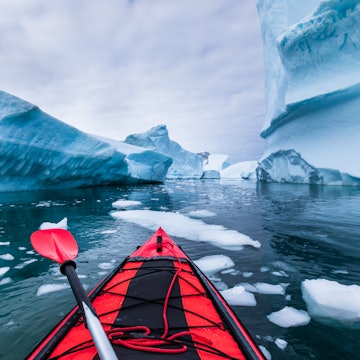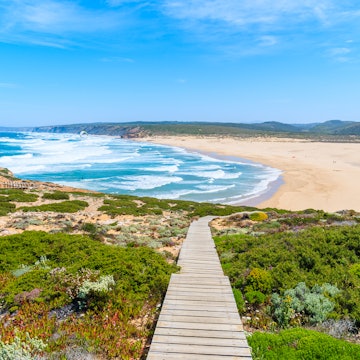
Denmark vs Finland: which Nordic country is better to visit?



Denmark’s beaches or Finland’s lakes? © iStock
These two countries consistently rank among the world’s best for livability, sophistication and happiness. So which one should you visit?
World-famous cuisine, or wilderness? Coziness or hardiness? Seaside beaches by the mile, or off-the-grid lakes?
While we would gladly opt for all of the above, life is short. Tough choices must be made. And sometimes, you must decide whether to visit Denmark or Finland, two countries consistently ranked among the world’s best for livability, sophistication and sheer happiness.
We’ve asked two partisans to make the case for why their pick edges out the other.

Denmark: hygge for all
A contributor to over 70 Lonely Planet books, Luke Waterson has traveled widely in Scandinavia – and is drawn to Denmark most.
On paper, Denmark is the dinkiest and least topographically impressive of the five Nordic nations. But it thinks mighty big.
Not only does it scoop the lion’s share of Scandinavia’s foreign tourists: it routinely makes the world’s top-20 most-visited countries, according to UNTWO (United Nations World Tourism Organization). What renders it so attractive? After many trips there, I’d say one factor stands out above myriad others: ease.
This has to be the planet’s most straightforward country to get around for first-timers. Almost everyone speaks some English – most to a high level – and everything you’ll want to do as a visitor is backed up by a comprehensive, English-language website or app, making communication effortless. A stellar railway network connects the country tip to tail, and buses efficiently link the few other travel destinations without stations. Its capital, Copenhagen, is a global leader in pedal-powered travel: there are free bikes to rent and impeccably maintained cycle lanes.

All this makes stress levels stay low as you explore – which only heightens your enjoyment of a place. No one is saying Finland is a navigation nightmare, but the going in Denmark is a good deal smoother and speedier. Copenhagen to Skagen (so southeast to extreme north) takes less than eight hours by rail; to get from Helsinki to Lapland adventure hub Inari, you’d need 15 hours by train and then bus.
Denmark’s small size comes with some limitations: there are none of Finland’s fells, no Arctic and fewer forests, which means no winter sports or bears to speak of (unless you include Greenland, technically part of the Kingdom of Denmark, in which case Danes outdo Finns for highest summits, Arctic square mileage, snow and bears). But “mainland” Denmark sports a sandy coastline any other country in Scandinavia would covet, and tourists do generally tend to prefer great beaches over prevalent bears.

Denmark’s sandy beaches indeed are ubiquitous. You’ll clock them everywhere from Copenhagen’s Amager Strandpark, just a 30-minute cycle from the city center, and through Baltic holidaymakers’ haven Bornholm. The dreamy, dune-rich Wadden Sea islands Rømø and Fanø boast respectively 12km (7.5-mile) and 15km (9.3-mile) unbroken lengths of fine-grained strand, while the Skagen region offers over 60km (37 miles) of beguiling beaches hem the shores.
And what do you need to do an average of three times daily every day you’re on vacation? Eat! Denmark, the birthplace of New Nordic cuisine and birthplace of the five-time recipient of the World’s Best Restaurant award, noma, would trounce most countries for fine dining (yep, Finland falls into the trounced category). Tally the Michelin stars each nation’s eateries have been awarded: as of 2023, it’s a convincing 45–8 in Denmark’s favor.

As you might expect from an incessantly inventive country that gave the world Lego and Google Maps, there is no dull, unused space in Denmark. That’s why the offshore waters are stippled with the highest per-capita ratio of wind turbines in the world. Why what would be just another harbor in any other city has, in Copenhagen, become an open-air swimming pool and a residential district made up of floating shipping containers, among many other things. And why the once-decrepit industrial stretches in northern Aalborg are now a blueprint for urban waterfront regeneration Europe-wide.
Prefer history to contemporary innovation on your vacation? Denmark was raising ostentatious castles and handsome timber-framed towns before Finland ever existed.
At the end of the day, ask yourself this. Would you rather have a big helping of hygge (a state of cozy conviviality that’s an integral part of the Danish psyche) or be whipped by a stranger with birch branches (as they do for health in Finland)?
I rest my case.

Finland: find your inner Finn in the world’s happiest country
Kerry Walker is a lifelong Finland fan and has traveled the length and breadth of the country: from remote swamps and forests groaning with bears and berries in the east all the way to Lapland’s icy northernmost tip.
Finland stole my heart the minute Lapland wrapped its snowy blanket around me more than a decade ago. Many trips later, I still can’t resist its elemental beauty.
That first visit to Utsjoki is freeze-framed in my mind: the unnerving silence and bone-chilling cold of the high Arctic, twinkling trees sculpted with hoarfrost, the endless white tundra, the snuffle of Sámi reindeer in the deep-blue polar night. I slept in a simple wooden cabin and regularly woke up after midnight to find the northern lights swooping and swaying overhead, as if the gods had flicked the disco lights on.
I instantly felt an affinity with this land and its mind-bending extremes of darkness and light, and this has only intensified over the years. Drive along the country’s ruler-straight roads for miles and all you see is forest, lakes and distant fells on repeat – a never-ending tapestry of green and blue. In some regions, you’re more likely to bump into elk and reindeer than people. Finland has nature in its bones.

And Finland captures the imagination long before you’ve even arrived. This is a country touched by magic, with its flying reindeer, Moomins and the one-and-only Santa up at the glittering Santa Claus Village in Rovaniemi. It’s a country where you can let your inner child run wild and free. Whichever way you look at it, Finland is the lovable odd one out among the Nordic countries, with its Elvish tales; a singsong language that inspired Tolkien’s pen; and fondness for weird foods like squeaky cheese (leipäjuusto) you dunk in coffee, salty licorice (salmiakki) and pine-tar liqueur (terwa).
Finland’s outlandish personality reveals itself in mad championships, too: wife-carrying and boot-throwing, swamp soccer and competitive sauna-going. It’s my kind of place.
Yes, Denmark blazes ahead in avant-garde design and gourmet cuisine. But while the Danes gladly blow their own trumpet, the Finns whisper modestly about their country’s charms. Even though, to be frank, they have plenty to shout about. The fact Finland is officially the world’s happiest country in the UN’s World Happiness Report for the sixth year running in 2023, for instance. Indeed, the longer you linger here, the more those happy vibes rub off. Now they are even offering a free master class in happiness for a lucky few.

The number-one secret? Living in tune with nature. In this generously spaced land, you can still hear the rustle of leaves, the rush of wind, the flutter of snowflakes. Even the country’s charismatic, easygoing cities are poised on the edge of big wilderness. On the breezy Baltic, Helsinki is sprinkled with islands and riven with inlets. Castle-topped Turku, the gateway to 20,000 islands and skerries, is island-hopping heaven for kayakers, cyclists and hikers. And in vivacious, cultured Tampere, you can grab a canoe and paddle across vast lakes.
Some of my happiest moments have been spent in Finland (statistically, no coincidence there). I’m talking tell-your-grandchildren moments like spending a hairs-on-end night in a solo hide at the Bear Centre in Lentiira, where brown bears sneak through old-growth boreal forest over to Russia. Or squelching through cottongrass-stippled swamps in search of amber-hued cloudberries – that most rare and precious of Arctic fruits – under the never-dying light of the midnight sun in Ranua. Or feeling the pulse of the reindeer-herding Sámi as the aurora dances above Lake Inari.

Many joke about the Finns being mirthless – but lurking beneath the surface is a dark, self-deprecating humor, a serious ability to party, a hatred of idle gossip and a passion for the deep and meaningful stuff. This nation was built on sisu, an impossible-to-translate characteristic embodying toughness, freedom, grit and bravery – the bear hug to Denmark’s air kiss.
So if you want to find your inner Finn (and the path to true happiness), understand this: walking for miles in mosquito-infested bogs to find berries, stripping naked to roast in a sauna, diving into a gaspingly cold ice hole and beating yourself with a birch branch are a Finn’s idea of fun.
And you know what? They are mine, too.















